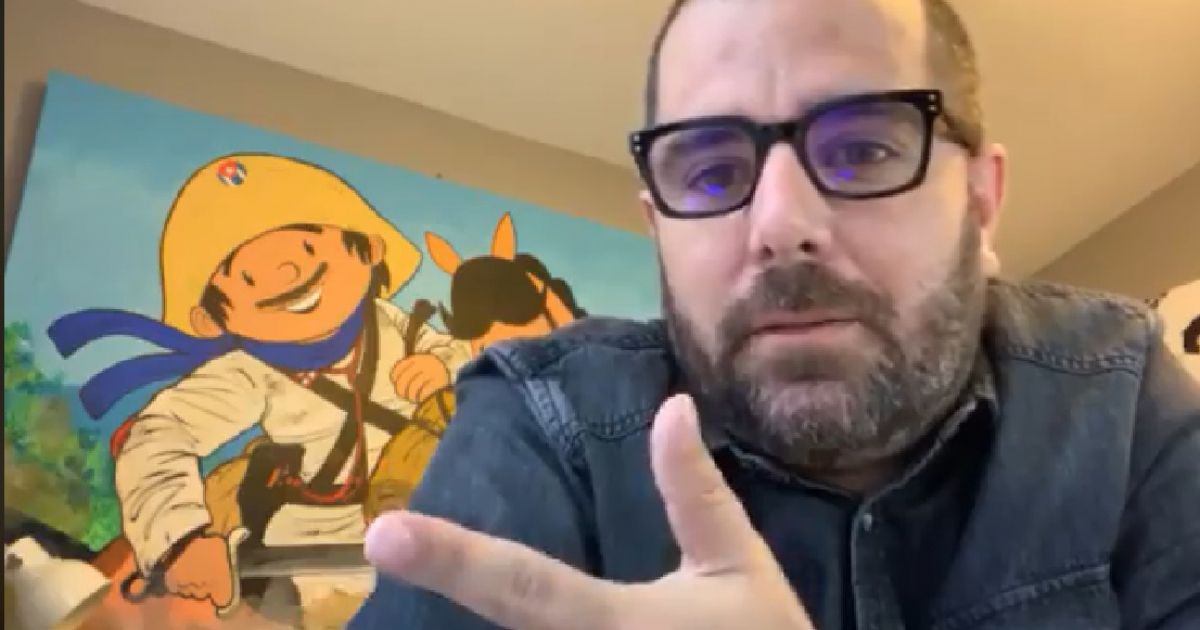
3 | 01/02/2021 – 6:29 AM (GMT-4)
The Cuban filmmaker, Ian PadrónHe recalled in an open letter due to the events at the Ministry of Culture (MINCULT) that his father was one of the creators who suffered from censorship from the government of Cuba.
Ian starts his story by explaining that in 2003 the ICAIC censored his documentary Out of competition, about Cuban baseball. He sought dialogue with the institution for months, but the response was silent, and that “absence of debate” resulted in ongoing events of bigotry by officials that culminated in verbal and physical attacks on him, in the ICAIC lobby.
“In the middle of that” storm “, my father Juan Padrón He asked me not to be paralyzed by these unfortunate events. It was then that we spoke for the first time about something that was very revealing to me: he was also censored and undervalued at one point, as were other greats he admired, such as Pablo Milanés, Silvio Rodriguez, Pastor Vega or Pedro Luis Ferrersays the filmmaker on his Facebook profile.
Ian assures his father excitedly ending that conversation. “The only real victory I had, despite misunderstandings, was to keep creating. Trust the Cuban audience and the time; they are the ones who will always have the last word, ”Juan Padrón told him.
In his post, Ian also referred to some figures and institutions within the cultural sphere in Cuba who were sometimes positioned in favor of those he labeled as ‘misunderstood’.
“As far as I’ve researched, people like Haydeé Santamaría were promoting spaces from The House of the Americas in favor of those who are “misunderstood”. Given this example, other institutions took the risk of giving room to artists branded as ‘misfits’ or ‘playing the enemy’s game’. That’s why today there are vampires in Havana, El Unicornio azul, Ojalá, Yolanda, Elpidio Valdés, The short space you are not in, Portrait of Teresa, 100% Cuban and La vaquita Pijirigua and many similar examples. Essential references in national culture, the result of those same artists who were previously labeled as ‘conflictive’, ”Ian said.
The response of Casa de Las Américas, in the light of the events of January 27It did not support dialogue, nor support the young protesters, as evidenced by a message broadcast through the portal Window where he defined what happened as “part of a scenario of provocation and destabilization set up to confuse”.
Silvio Rodriguezmeanwhile He preferred to turn a blind eye and indicated that he could not see the videos showing violence by government officials against peaceful protesters.
The Cuban singer-songwriter, Pedro Luis Ferrer, on the other hand, publicly expressed his deep rejection the use of force by MINCULT workers. He pointed out that the blows (in clear reference to Alpidio Alonso’s attitude) are to avoid having to discuss what is inappropriate, and said he is sad and deeply concerned about the “spiritual destiny” of the Cuban people.
One of the concerns that worries Ian Padrón events that took place on January 27 in front of MINCULT headquarters it is because the pro-government media is labeling the young protesters as “mercenaries”.
Calling him a mercenary is a very serious charge that can have moral consequences for him, his family, and his friends. I know firsthand, ”Padrón assured.
The violent attitude of the officials of Culture, with Minister Alpidio Alonso at the helmthe Cuban filmmaker interpreted it as an uncomfortable statement from MINCULT that he no longer wants demonstrations in front of his headquarters.
In this sense, it believes that it is “something in keeping with Cuba today.” However, he thinks that from that point to the arrest and trying to label all those who were there as “workers of the empire” there is a generalization that could become “dangerous.”
Ian wonders what will happen to any people who may be innocent of such accusations; and whether there really are opportunities for dialogue in Cuba under the prescriptions of impeachment without the right to answer.
In the same way, he uses his open letter to appeal for reflection, both for Cuban artists and for state institutions.
“I ask Cuban artists to delve into everything that has happened and the cultural institutions that ‘don’t throw the bank away’. Try to get to know these people who were there, don’t turn your back on them. The rest of the world is in control. full of “young” Cubans who found no place in Cuban society and had to look for other horizons. The vast majority of us are also honest and will love our homeland until the end of our days, “said the filmmaker.
“If on the one hand felt threatened by the presence of the police and on the other hand, the institution feels threatened by the filming of telephones; It is an unequivocal sign that the conditions for real dialogue were not in place. I think both sides have a responsibility to do better in this, ”he said.
The filmmaker believes that “the day when the necessary dialogue takes place and you want to show mutual trust; it should be open, with cameras and state media, foreign or independent; without secrecy or distrust of others.”
Ian Padrón’s message is addressed to those who “still make themselves heard” and repeats his rejection of violence by government officials against the group of young independent artists and journalists who peacefully demonstrated in front of MINCULT headquarters on January 27.